Marco Etheridge's Blog, page 14
February 15, 2018
Managua Walkabout
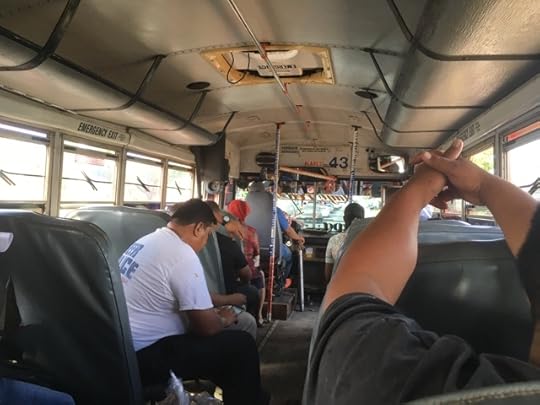
Local buses, Managua style.
A free day, an alone day, a day without goals or plans, these are the components of a good walkabout. My cadre of compadres was not due until the following day. I had an entire day to explore the sprawling Central American city of Managua.
Not many tourists see Managua. There are some reasons for that. Not the prettiest city to begin with, in 1972 Managua was devastated by an earthquake. The quake destroyed a large part of the city, killing as many as ten thousand people, injuring more than twenty thousand, and leaving perhaps three hundred thousand homeless. Aid poured into the country and was promptly snatched up by the ruling dictator and his cronies. Anastasia Somoza and his pals gathered up most of the money and left the citizens to fend for themselves. Thus was Managua forever altered and the final seeds of the Nicaraguan Revolution sown. But that is the stuff of another blog post.
The metropolitan area of Managua is a sprawl of low slung building cast across a wide area. There are about 2.5 million folks living and working here. Getting around is tough, with the main form of transport being the smoke-belching buses that lurch through the snarl of city traffic. I love me a good bus ride, so I jumped aboard happily. Three Córdoba, about a dime, will allow you to transit the city and get in touch with your mortality at the same time. Our driver had a nice section of hardware store pipe for a shifter linkage. If he lifted up on the rag tied to the end, the entire homemade shifter arm would part from the floor. Things like this add a certain flavor to a good bus ride. After two buses and some help from the locals, I found myself in the dusty city center.
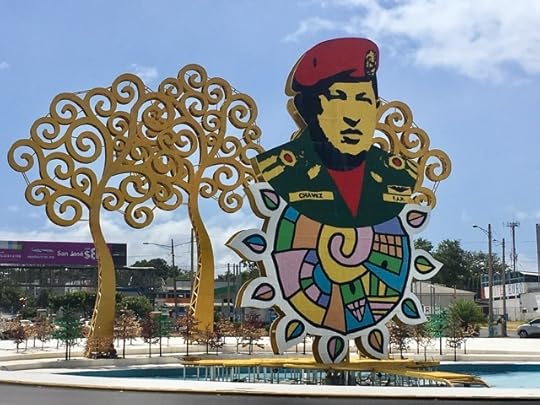
Revolutionary Heroes on the Street
The earthquake knocked down the tall buildings of Managua. It is a low-slung city. The wind rolls in off Lake Managua, sending dust devils dancing. Hot, dusty, windy, devoid of tourist "sights," there is a reason that Managua has few visitors. The interest, for me, is the reality of a busy, gritty, working city in Central American. There is no other way to see how real people live, than to plunge into the streets and experience it.

The National Palace and Managua Emptiness
I walked my legs off, starting at the southern part of the city center and working north towards the lake. What there was to see was made up of folks doing their jobs, students at the University, the windswept emptiness around a stadium, and lonely bits of park. At the northern end of Avenida de Simon de Bolivar, a traveler will come upon the wide spaces and parks that lead to the Palacio de National. Behind the palace is the ghost of the Managua Cathedral. Roofless, windowless, stone blocks cracked clean through, the Cathedral was the most famous victim of the earthquake.
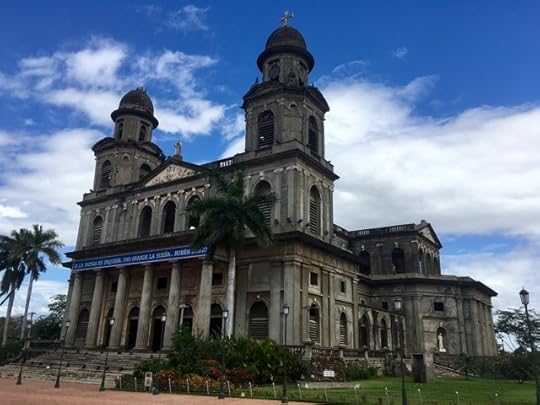
The Cathedral
Continuing on from through the greenery of the parks and myriad monuments to very dead revolutionary heroes, a stalwart walker will find himself on the promenade along Lake Managua. The wind whips whitecaps across the water, clouds dance around the tips of stout volcanoes, and the sun beats down. The place was almost devoid of humans, that strange emptiness of a beach resort in winter. The jetty, as well as many boulevards of the city, is adorned with huge metals sculptures of trees and flowers, which the locals call The Folly, due to their cost.

Managua Seawall
Finally worn down by walking, the sun, and the wind, I headed for the bus home. There are no gringos riding the city buses. Indeed, there are very few gringos at all. I stood out like sore thumb on a one-armed man. The locals were puzzled by my presence, but very friendly and helpful. The older ladies, in particular, were very concerned that I should get on the correct bus. With a little help and a little luck, I rode the belching beasts seven kilometers back to the barrio I was staying in. Disappearing into the barrio brought a welcome sensation of green and quiet.
After a rest and a washup, it was time for dinner. I must admit that I failed in the endeavor. I ended up with a plate of carne asada and pico de gallo from which every trace of life and taste had been cooked. It is best forgotten, not to be mentioned again.
Most travelers to Nicaragua spend one night at a hotel near the airport, transferring on to other places the next day. Poor orphaned Managua, dusty and ignored. Can I recommend a day of walkabout there? Perhaps not. I enjoyed myself immensely, but there is nothing to point to and say "You must see this or that." If one desires to experience a real Central American city, warts and all, Managua is a good place to do so. If not, continue on to the colonial quaintness of Granada of the dramatic slopes of the many volcanoes.
Published on February 15, 2018 15:05
The Piper Calls -- Nicaragua

Winter -- Wien
One could understand why a fella might want to wander away from a Northern European winter. As much as enjoy living in Vienna, during the winter it is generally grim and gray. A person might want to go to, say, Nicaragua. That would look more like this:
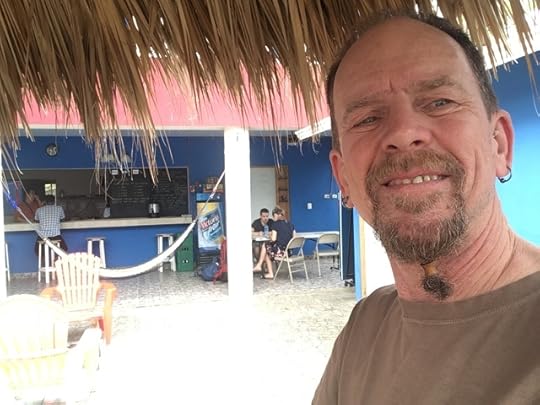
"Winter" -- Managua
Hammocks, heat, you can see that it might be preferable. But to get there, well, one has to Pay the Piper.
This is a simple process for me. Not an easy process, but simple. Make a pile of goods, lay out the passport, stuff everything in the faithful Deuter backpack. When the pile is empty, I'm ready. But the twenty hours of transit, that is a different animal. As a veteran of many a long flight day, I have a few tricks. The first is to forget about relative time. The second is to adjust my brain rheostat to "Kid" setting. This helps a great deal. Being fascinated with the smallest detail makes the long hours on planes bearable. What IS this food? What is that little girl doing? What does this button do? You get the idea. Dwelling on the destination only serves to prolong the discomfort.
Wien to Amsterdam, Amsterdam to Houston, Houston to Managua. A series of checkpoints along the course of the long day. Check bag, find gate, wait. Board the plane, wait. Quick transfer in Amsterdam, just make it, my name called at the gate. Not good. Extra passport check because I am a US citizen transiting through the US without stopping. Red Flag. Problem solved. Board the big plane, wait. Little kid in the row ahead, red alert. She turns out to be the flying angel champion of the world. Yay! Cute kid to play with, distraction. Surrounded by Dutchies, 25 young women on a youth group to Nicaragua. Laughing and giggling. Great! More distraction. Houston, US Customs, no problem. Four-hour layover, a great time to have a cigar and, as it turns out, a fascinating conversation with a Czech national who lives in Canada. Being involved in the process makes the process more palatable.
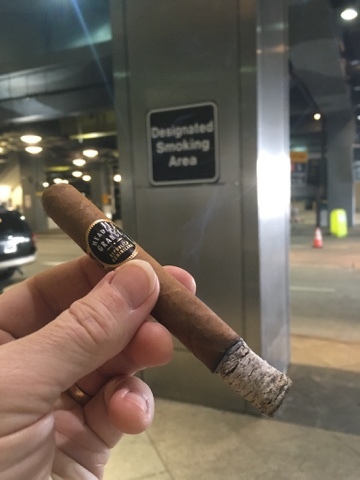
Houston -- Cigar Time Layover
So it goes. The magic is in the last flight. All the connections have worked, I am on the last flight of the day, and the next stop is The Destination. Thus it is the hardest flight. Landing in Managua, the interminable passport control at Augusto Sandino airport. One hour in line, feet aching. Finally the blast of heat as I step into the New World. There is the young Nica guy with my name on a placard. The last vehicle transfer of the day, thankfully complete, and I am in my hotel compound on a tiny backstreet of Managua. I am vibrating from the travel, in the zone of sleep deprivation and wired excitement. Sleep is not an immediate possibility.
I sit in the heat and dark of a Managua night. The fridge yields orange soda which, when combined with a cigar, tastes like a Creamsicle with fangs. A poor choice on a normal day, but fascinating tonight. As the edges finally soften, sleep creeps up. Another epic travel day to add to the collection. They are long days, and hard, but the Piper demands his cut of the trip. I pay him gladly.
Published on February 15, 2018 09:57
January 21, 2018
Putting Flesh on Bone: Building a Novel
 As a writer, one of the most common questions I am asked is: "Where do you get your ideas for a novel?' People seem to be fascinated with the initial part of the writing process, the conception of a story.
As a writer, one of the most common questions I am asked is: "Where do you get your ideas for a novel?' People seem to be fascinated with the initial part of the writing process, the conception of a story. Authors, like the rest of the folks on the planet, are as different as grains of sand on a beach. Yet we share commonality as well. There seem to be two basic categories of novelists, Pantsers and Outliners. As I start my third novel, I am transitioning from one to the other.
Pantsers, as the name implies, are authors who write by the seat of their pants. They get an idea or concept for a story and sit down to write. This is exactly how I wrote my first two novels. My first novel, "The Best Dark Rain: A Post-Apocalyptic Struggle for Life and Love," began as a serial. I was writing at least one chapter per week. The chapter was then uploaded to a website where my Beta-Reader Dark Army could read it. Woe betide me if the chapter was not complete.
My second novel, "Blood Rust Chains," was written for the Nanowrite novel competition, which is held yearly in the month of November. The Nanowrite challenge is to write an entire first draft of a novel in thirty days. I was challenged by a friend of mine, also a writer, to participate in Nanowrite. The result, after a grinding thirty days, was a 65,000 word first draft. The idea for the novel came from a dream. From there, I simply tried to hammer it into a story in the allotted thirty days. Of course, that first draft was not a final, polished story. It was, however, an achievement that I am proud of and will probably never attempt to repeat.
Being a Pantser has its joys and sorrows. The joy comes from the organic process of simply beginning a story and tearing into it. The sorrow comes from dead-ends, corners written into, and not knowing exactly where the story is going to go. When I was writing the serial that would become my first novel, what was already uploaded for readers had taken on a life of its own. There was no turning back. To paraphrase the old saying: The Novel Must Go On.

Stories take on a momentum and life of their own. While I was learning the brutal lessons of marketing my first novel, a pile of ideas and notes was growing. This little pile became a file on my laptop, the icon where scraps of characters, ideas, and random thoughts were pigeon-holed. The file, in the upper-left corner of my desktop, continued to nag at me. It was forlorn and feeling forgotten. The nagging is a good thing, a sign that things are moving forward. So it was with this, the Working Title file. And so began my transition to being an Outliner.
An Outliner is, obviously, a writer who builds an outline. This is the antithesis of the Pantser. One saving grace for aspiring writers is that writers love to write, and writers love to write about the process of writing. I did a lot of homework on various methods and tools for outlining a novel. In so doing, I stumbled across the Snowflake Method espoused by Randy Ingermanson. The basic idea of the Snowflake Method is that the shape of a novel begins very simply. Write the novel in one sentence. This is a lot harder than it sounds, but it is a great exercise. Then expand that single sentence into one paragraph. Then expand each sentence of the paragraph into another paragraph. The idea is one of building a series of simple shapes that, when overlaid upon each other, become a complex shape: a snowflake. Thus began my outline.
Here is a link to Randy's website and his super-informative "how-to" on the Snowflake Method.
Randy Ingermanson's Snowflake Method
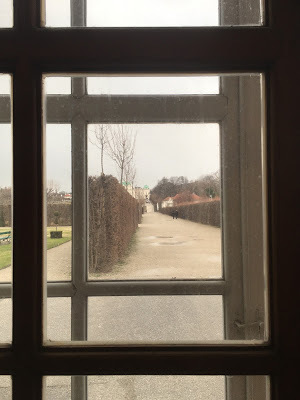
My start date was the First of January. I am not a resolution person, but that is just how things worked out. Following the step-by-step directions, I built my outline. Over the next three weeks, I worked with diligence, following the Snowflake Method to the letter. As the sentences became paragraphs, and the paragraphs morphed into a concise list of scenes, I watched the entire story begin to take shape before my eyes. What emerged was the skeleton of a complete novel, consisting of thirty-four chapters and one hundred thirty scenes.
When I was a boy, I had a precious book. The book was "101 Elephant Jokes." I used to torture my father with these jokes, which I thought were hilarious. One of the jokes went something like this: "How do you make a statue of an elephant? Simple, get a ten-ton block of granite and chip off anything that doesn't look like an elephant." This corny joke is, for me, at the core of being a Pantser. Now, as an Outliner, I am working from a totally different direction. Instead of reducing a giant pile of words into the shape of a novel, I am attaching words to a skeleton, adding the muscle and fiber of the story to the bones that support it.
The act of writing is, if nothing else, an amazing journey. There are many paths to the mountain, with the only caveat being: Tell a Good Story. How one arrives at that story is just a part of the process. I am very curious to see how this process will unfold as I hang the flesh of my tale onto the bones that will, hopefully, support it.
The outline is now complete. I will begin writing the first draft on Tuesday. One hundred and thirty scenes, each consisting of a thousand words or so, becomes a novel of 130,000 words. I hope to have the first draft completed by the end of April, or about one hundred writing days from now. That's it, that is how it happens. Wish me luck, please, as I will need it along the way. And, as always, thanks for reading.
 Marco Etheridge lives and writes in Vienna, Austria, where he is currently at work on his third novel. His first novel, "The Best Dark Rain: A Post-Apocalyptic Struggle for life and Love," is available on Amazon at:
Marco Etheridge lives and writes in Vienna, Austria, where he is currently at work on his third novel. His first novel, "The Best Dark Rain: A Post-Apocalyptic Struggle for life and Love," is available on Amazon at:"The Best Dark Rain" on Amazon
Marco's second novel, "Blood Rust Chains," is scheduled for publication in May of this year.
For updates on current novels and projects, please visit Marco's Author Website at:
Marco Etheridge Ficition
Published on January 21, 2018 04:27
January 14, 2018
A Citizen of the World Replies
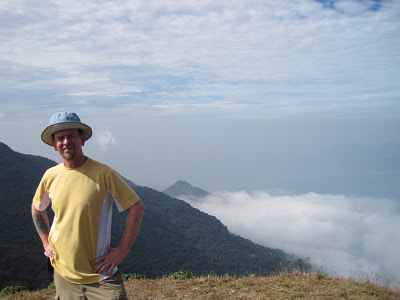 Chembra Peak, Western Ghats, Kalpetta, India
Chembra Peak, Western Ghats, Kalpetta, IndiaI think of myself as a citizen of the World. As a citizen of the World, I am saddened when anyone disparages folks from other countries or cultures. This kind of hateful speech is far worse when the person dispensing cultural slander is a so-called leader of the free world. To use derogatory terms when speaking of other nations, other peoples, or other cultures, is to speak from ignorance and fear. This, then, is my response to words spoken out of ignorance and fear.
I am an incredibly lucky human being. Over the course of my life, particularly the last fifteen years, I have traveled about the world. My motto has become: "Wherever, whenever." During these wanderings, I have trod the soil of more than thirty countries on four continents and the odd sub-continent. The planet has become my playground, an enormous sandbox, with all of the folks in the world for playmates. Some of the places to which I have traveled would be considered incredibly poor, at least when measured by the ruler of 'First-World' standards. Yet everywhere I go, I am treated with generosity and kindness. The lesson that is reinforced for me, journey after journey, is that the human beings on this planet share a great deal more commonality than they do differences.
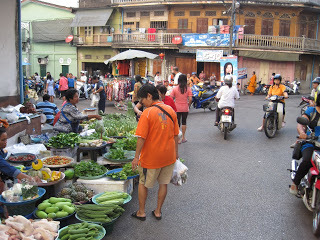 I meet all sorts of folks whilst traveling. The people I meet hold all manner of beliefs, customs, and favorite local cuisines. These are peoples of all races. Despite the superficial differences, however, what I have discovered is that human beings all over the world want the same basic things. Folks want food to eat, clean water to drink, a decent place to live, a safe place for their family, and a better life for their kids. What I learn, time and again, is that there are far more similarities between people than differences.
I meet all sorts of folks whilst traveling. The people I meet hold all manner of beliefs, customs, and favorite local cuisines. These are peoples of all races. Despite the superficial differences, however, what I have discovered is that human beings all over the world want the same basic things. Folks want food to eat, clean water to drink, a decent place to live, a safe place for their family, and a better life for their kids. What I learn, time and again, is that there are far more similarities between people than differences.Shopping, Mekong Delta, Vietnam
As I wander about, I begin to learn more about other people and more about myself. For instance, folks all over the world love to laugh. They like to sit around and tell jokes, pull pranks, and have a good belly laugh. Sometimes you might find yourself to be the subject of a joke, which, given the differences in language and culture, can be a tricky thing. My experience has been that if I cut loose with my own big laugh, we all end up falling about the place and having a rollicking good time. Therein lies another universal human trait: we all love folks who can laugh at themselves.
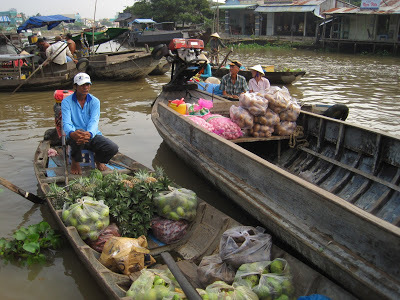 Shopping, aquatic style, Mekong Delta, Vietnam
Shopping, aquatic style, Mekong Delta, Vietnam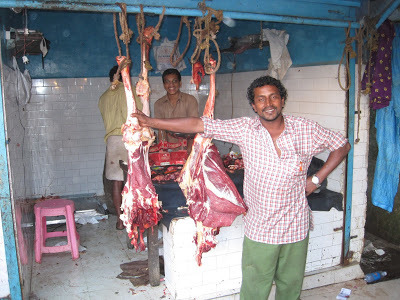
Another seemingly universal trait amongst human beings is taking pride in what we do. Folks are pleased when someone expresses an interest in their livelihood, their profession, or their work. Time and again I have been invited into workshops, stalls, and garages, simply because I expressed an interest in what folks were doing and how they got it done.
Proud Butcher Stall Proprietor, Southern India.
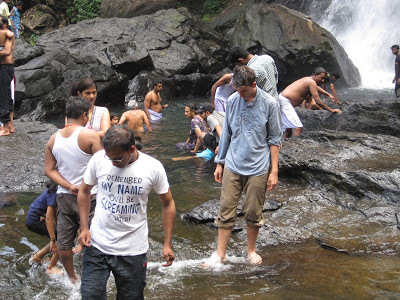 Across the globe, folks like to splash in the water.
Across the globe, folks like to splash in the water.Human beings love to play games. And what greater fun than to invite the goofy foreigner to join them in whatever the game de jour might be? I have been invited to join in pickup games of cricket, füssball, sepak takraw (Thai foot badminton), and even Old-Lady aerobics on the public promenade in Cambodia. Go ahead, join in the game. As long as one remembers the rule about being able to laugh at oneself, all will be well. Play well with others, and they will play well with you.

Gecko, Zadar, Croatia
Sometimes there might be critters who live in close proximity with humans. Get used to it, it'll be okay. Besides, they eat the pesky bugs.
 Village Wedding Party, Isaan, Thailand
Village Wedding Party, Isaan, ThailandFolks around this big green globe of ours love to party. Any excuse for a party is probably excuse enough. Folks really love it when a foreigner abandons reticence and joins the fun. Eating, drinking, and dancing are things all human beings can identify with. I have been lucky enough to take part in Independence Day in Panama City, Carnival in Cartagena, 500th Anniversary celebrations in Quito, and village parties in Thailand. Join in, dance, get sweaty, revel with your fellow human beings. Laugh like a maniac when you get squirted with water, colored with crazy dyes, or find yourself dancing with a seventy year-old granny in a bustier on the streets of Panama City. It's all part of the grand pageant, and the sidelines are for voyeurs.
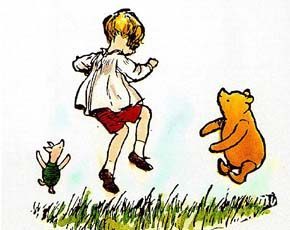 People Love to Dance and They Love to Help
People Love to Dance and They Love to Help Whether you are a Pooh, a Piglet, or a Christopher Robin, don't forget to shake your booty like there is no tomorrow. And do not be surprised when help comes in unexpected ways. When I stupidly ran out of fuel in the jungle of northern Thailand, it was poor villagers who helped me, not only refusing any money in return, but making sure that I had a cold drink as well. When no one could find my bag in in India, it was a young Hindu kid who searched it out, despite the officials saying it was not there.
 Everybody Loves Grub
Everybody Loves GrubFolks love to eat, and folks are proud of their local cuisine. Half of the fun of travel is treating your taste buds to exotic new flavors. Take the plunge, belly up to the counter or plant yourself on the rickety plastic chair at the street stand, and dig in. You might not like everything, but the local people will certainly like it that you tried everything.
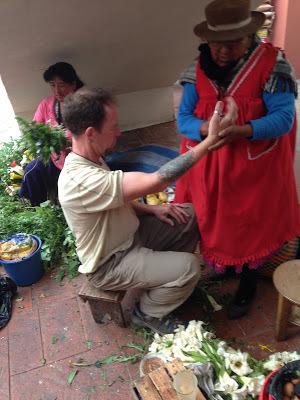
Indian Shaman Woman, Cuenca, Ecuador
I have found it very important to remember that just because something is not of your culture, this does not mean that it is without value. I received a thorough tune-up from an Indian Shaman in Ecuador. She beat me with a bouquet of flowers and herbs, rubbed an egg all over me, sprayed me with a milky-white fermented drink (sprayed out of her mouth!) and rubbed charcoal on my forehead. Crazy right? I admit that it was. I am also here to tell you is that afterwards I felt great, all tingly and alive. Varied experiences broaden my mind, allowing me to incorporate new and different ideas and customs. Thus my world becomes both larger and more familiar.
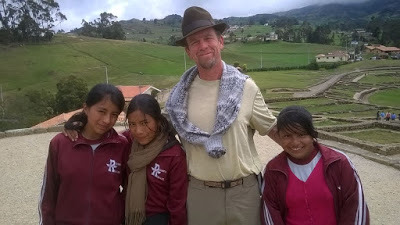 Inca Highlands, Ecuador - or - People Love Photo-Ops with the Goofy Foreigner
Inca Highlands, Ecuador - or - People Love Photo-Ops with the Goofy Foreigner
In conclusion, my experiences across our shared globe have been those of commonality with our fellow travelers. The human beings who share this amazing planet also share the same hopes, dreams, and basic needs. I would ask you, dear reader, to try the following experiment. The next time you hear someone spouting hateful garbage about other countries, cultures, or peoples, ask them if they have a valid passport.
Thanks for reading! Travel often, travel well, and play nice with others.
The Reverend Squeaky-EyeMarco EtheridgeVienna, AustriaJanuary 2018
PS: If you like what you read here, please feel free to pass it on. Sharing is caring. We are all in this together.
Published on January 14, 2018 08:23
January 12, 2018
Amazon Giveaway
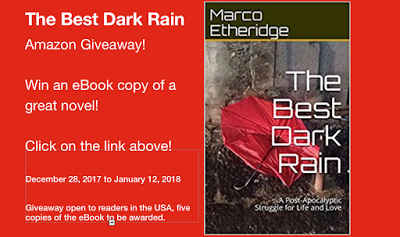 The Best Dark Rain
The Best Dark Rain"Fun and Exciting..."
"This one has legs."
"Gripping with excellent writing"
"Lots of action, suspenseful."
"Tense, thought-provoking and terrifying."
"Once you start, you won't want to stop."
The Amazon Giveaway for The Best Dark Rain: A Post-Apocalyptic Struggle for Life and Love ends at midnight tonight, PST. That means you have less than two hours to enter for one of five chances to win.
Published on January 12, 2018 22:05
January 11, 2018
Sending a Novel into the World -- or -- A Babe in the Woods
This post was originally published as a guest post on Amber Gregg's Blog "Judging More than the Cover" Click here for the original PostThis is a guest post by Marco Etheridge.
 You might be someone who dreams of writing a great novel, a novel that will hold readers spellbound. Taking up paper and pen, or more likely laptop and keyboard, you begin to write. Perhaps you are lucky enough to have some beta-readers, friends and family whom you can torture with a first draft. Fueled by their encouragement, you grind through the rewrites, the editing, the proof-reading. Then comes the happy day when you have brought forth a completed novel, a new and sparkling creation into which you have poured your heart and soul. Your baby, this fondling novel that you have created, is now ready to venture out into the jungle of publishing. Poor thing.For an author, the completion of a novel is but the first step on a long road. In the halcyon days of my youth, back when double-spaced sentences were the norm, there existed the Golden Myth: The Big Contract. Advances! Royalties! Talk-Shows! The thing is, sometimes, for the very lucky and the very few, it actually happened. There were writers at the sharp tip of the iceberg, breathing the rarefied air of the NY Times Bestseller list. These literary lions had publicists and agents, marketing gurus and hotshot editors. At the heart of the Golden Myth was the debut author rocketing to a place amongst these giants of literature. What a lovely fable it was.In the less-mythical world of modern publishing, the process is normally not so meteoric. Should you desire a traditional publishing contract, you will need a great pitch, a lot of research time, and a very thick skin. Several hundred query letters later, and possessing a file fat with polite rejections, you may have to consider other options.
You might be someone who dreams of writing a great novel, a novel that will hold readers spellbound. Taking up paper and pen, or more likely laptop and keyboard, you begin to write. Perhaps you are lucky enough to have some beta-readers, friends and family whom you can torture with a first draft. Fueled by their encouragement, you grind through the rewrites, the editing, the proof-reading. Then comes the happy day when you have brought forth a completed novel, a new and sparkling creation into which you have poured your heart and soul. Your baby, this fondling novel that you have created, is now ready to venture out into the jungle of publishing. Poor thing.For an author, the completion of a novel is but the first step on a long road. In the halcyon days of my youth, back when double-spaced sentences were the norm, there existed the Golden Myth: The Big Contract. Advances! Royalties! Talk-Shows! The thing is, sometimes, for the very lucky and the very few, it actually happened. There were writers at the sharp tip of the iceberg, breathing the rarefied air of the NY Times Bestseller list. These literary lions had publicists and agents, marketing gurus and hotshot editors. At the heart of the Golden Myth was the debut author rocketing to a place amongst these giants of literature. What a lovely fable it was.In the less-mythical world of modern publishing, the process is normally not so meteoric. Should you desire a traditional publishing contract, you will need a great pitch, a lot of research time, and a very thick skin. Several hundred query letters later, and possessing a file fat with polite rejections, you may have to consider other options.
 There are approximately 500,000 authors selling books on Amazon, and that is just one platform. Therein lies both the salvation and conundrum for debut authors. For salvation, it is quite possible for a debut author to publish on Amazon, Smashwords, and other eBook sites. The process demands determined editing, proof-reading, and hard-won lessons in formatting, but it can be done. For conundrum, your novel is now one small tree amidst a forest of other novels. Using a very conservative figure, more than 100,000 English-language novels were published in 2017. Thus your new novel, whether traditionally or self-published, is wandering in a densely packed jungle of other books, each one crying out for attention.During those first intoxicating days following publication, you watch your novel’s progress into the world. As friends and family buy your book, hope wells in your heart. Electronic publishing allows almost instantaneous views of one’s book sales, which is both a blessing and a curse. There comes a day, alas too soon, when the friend and family pool runs dry. Sales of your book languish. Your infant novel is now truly on its own. Welcome to the world of modern-day publishing. Gone is the era when authors wrote and publicists publicized. It is now the authors who must do the selling, the trench work, the pimping. Publishing houses and agents want authors who have built a "Platform" of online presence, social media marketing, author websites, and the like. It matters not whether you are fortunate enough to have a traditional publishing contract, or are self-published. For both new and established authors the mantra of publishing is: "We are all in Sales.”The reality of selling your book is that you must become an entrepreneur. The path of the Author becomes the journey of the Author-Entrepreneur. It is a journey full of new and bewildering twists and turns. Meta-Data, Categories, Giveaways, and Search Engine Optimization are just a few of the lessons that lurk along the way. The entire process can be boiled down to one simple question: How can I get my novel noticed by potential readers?
There are approximately 500,000 authors selling books on Amazon, and that is just one platform. Therein lies both the salvation and conundrum for debut authors. For salvation, it is quite possible for a debut author to publish on Amazon, Smashwords, and other eBook sites. The process demands determined editing, proof-reading, and hard-won lessons in formatting, but it can be done. For conundrum, your novel is now one small tree amidst a forest of other novels. Using a very conservative figure, more than 100,000 English-language novels were published in 2017. Thus your new novel, whether traditionally or self-published, is wandering in a densely packed jungle of other books, each one crying out for attention.During those first intoxicating days following publication, you watch your novel’s progress into the world. As friends and family buy your book, hope wells in your heart. Electronic publishing allows almost instantaneous views of one’s book sales, which is both a blessing and a curse. There comes a day, alas too soon, when the friend and family pool runs dry. Sales of your book languish. Your infant novel is now truly on its own. Welcome to the world of modern-day publishing. Gone is the era when authors wrote and publicists publicized. It is now the authors who must do the selling, the trench work, the pimping. Publishing houses and agents want authors who have built a "Platform" of online presence, social media marketing, author websites, and the like. It matters not whether you are fortunate enough to have a traditional publishing contract, or are self-published. For both new and established authors the mantra of publishing is: "We are all in Sales.”The reality of selling your book is that you must become an entrepreneur. The path of the Author becomes the journey of the Author-Entrepreneur. It is a journey full of new and bewildering twists and turns. Meta-Data, Categories, Giveaways, and Search Engine Optimization are just a few of the lessons that lurk along the way. The entire process can be boiled down to one simple question: How can I get my novel noticed by potential readers?
 Lest I paint too dark a picture, new authors take heart. There is hope! The nuts and bolts of self-marketing a novel far exceed the scope of this blog post. Fortunately, there is a plethora of information available on how to market one’s book. Writers love to write, and they love to write about the perils of writing. There exists a wide array of books, articles, blog posts, and podcasts, all dedicated to helping aspiring Author-Entrepreneurs. A simple internet search will reveal many tricks of the trade, tricks that will require diligent work, but which will yield results for your novel. I am obliged to extend my deeply heartfelt thanks to all of the writers out there who have so graciously shared their experience and knowledge.Authors take heart! Thank you for writing new books. The world needs books, now more than ever. So write a book, publish the book, repeat as needed. Be well, be happy, and keep writing.
Lest I paint too dark a picture, new authors take heart. There is hope! The nuts and bolts of self-marketing a novel far exceed the scope of this blog post. Fortunately, there is a plethora of information available on how to market one’s book. Writers love to write, and they love to write about the perils of writing. There exists a wide array of books, articles, blog posts, and podcasts, all dedicated to helping aspiring Author-Entrepreneurs. A simple internet search will reveal many tricks of the trade, tricks that will require diligent work, but which will yield results for your novel. I am obliged to extend my deeply heartfelt thanks to all of the writers out there who have so graciously shared their experience and knowledge.Authors take heart! Thank you for writing new books. The world needs books, now more than ever. So write a book, publish the book, repeat as needed. Be well, be happy, and keep writing.
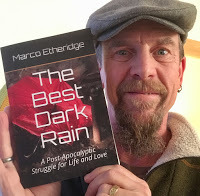
An ex-resident of Seattle, Marco Etheridge lives and writes in Vienna, Austria. When he isn’t creating great fiction or being a good Hausmann, he explores the world with his lovely wife. If the sun is shining too brightly, or the birds are too chipper, Marco studies German grammar to create a suitably dark mood for creativity. Marco’s debut novel, The Best Dark Rain: A Post-Apocalyptic Struggle for Life and Love, is available on Amazon.Click here to go to The Best Dark Rain on Amazon
 You might be someone who dreams of writing a great novel, a novel that will hold readers spellbound. Taking up paper and pen, or more likely laptop and keyboard, you begin to write. Perhaps you are lucky enough to have some beta-readers, friends and family whom you can torture with a first draft. Fueled by their encouragement, you grind through the rewrites, the editing, the proof-reading. Then comes the happy day when you have brought forth a completed novel, a new and sparkling creation into which you have poured your heart and soul. Your baby, this fondling novel that you have created, is now ready to venture out into the jungle of publishing. Poor thing.For an author, the completion of a novel is but the first step on a long road. In the halcyon days of my youth, back when double-spaced sentences were the norm, there existed the Golden Myth: The Big Contract. Advances! Royalties! Talk-Shows! The thing is, sometimes, for the very lucky and the very few, it actually happened. There were writers at the sharp tip of the iceberg, breathing the rarefied air of the NY Times Bestseller list. These literary lions had publicists and agents, marketing gurus and hotshot editors. At the heart of the Golden Myth was the debut author rocketing to a place amongst these giants of literature. What a lovely fable it was.In the less-mythical world of modern publishing, the process is normally not so meteoric. Should you desire a traditional publishing contract, you will need a great pitch, a lot of research time, and a very thick skin. Several hundred query letters later, and possessing a file fat with polite rejections, you may have to consider other options.
You might be someone who dreams of writing a great novel, a novel that will hold readers spellbound. Taking up paper and pen, or more likely laptop and keyboard, you begin to write. Perhaps you are lucky enough to have some beta-readers, friends and family whom you can torture with a first draft. Fueled by their encouragement, you grind through the rewrites, the editing, the proof-reading. Then comes the happy day when you have brought forth a completed novel, a new and sparkling creation into which you have poured your heart and soul. Your baby, this fondling novel that you have created, is now ready to venture out into the jungle of publishing. Poor thing.For an author, the completion of a novel is but the first step on a long road. In the halcyon days of my youth, back when double-spaced sentences were the norm, there existed the Golden Myth: The Big Contract. Advances! Royalties! Talk-Shows! The thing is, sometimes, for the very lucky and the very few, it actually happened. There were writers at the sharp tip of the iceberg, breathing the rarefied air of the NY Times Bestseller list. These literary lions had publicists and agents, marketing gurus and hotshot editors. At the heart of the Golden Myth was the debut author rocketing to a place amongst these giants of literature. What a lovely fable it was.In the less-mythical world of modern publishing, the process is normally not so meteoric. Should you desire a traditional publishing contract, you will need a great pitch, a lot of research time, and a very thick skin. Several hundred query letters later, and possessing a file fat with polite rejections, you may have to consider other options.
 There are approximately 500,000 authors selling books on Amazon, and that is just one platform. Therein lies both the salvation and conundrum for debut authors. For salvation, it is quite possible for a debut author to publish on Amazon, Smashwords, and other eBook sites. The process demands determined editing, proof-reading, and hard-won lessons in formatting, but it can be done. For conundrum, your novel is now one small tree amidst a forest of other novels. Using a very conservative figure, more than 100,000 English-language novels were published in 2017. Thus your new novel, whether traditionally or self-published, is wandering in a densely packed jungle of other books, each one crying out for attention.During those first intoxicating days following publication, you watch your novel’s progress into the world. As friends and family buy your book, hope wells in your heart. Electronic publishing allows almost instantaneous views of one’s book sales, which is both a blessing and a curse. There comes a day, alas too soon, when the friend and family pool runs dry. Sales of your book languish. Your infant novel is now truly on its own. Welcome to the world of modern-day publishing. Gone is the era when authors wrote and publicists publicized. It is now the authors who must do the selling, the trench work, the pimping. Publishing houses and agents want authors who have built a "Platform" of online presence, social media marketing, author websites, and the like. It matters not whether you are fortunate enough to have a traditional publishing contract, or are self-published. For both new and established authors the mantra of publishing is: "We are all in Sales.”The reality of selling your book is that you must become an entrepreneur. The path of the Author becomes the journey of the Author-Entrepreneur. It is a journey full of new and bewildering twists and turns. Meta-Data, Categories, Giveaways, and Search Engine Optimization are just a few of the lessons that lurk along the way. The entire process can be boiled down to one simple question: How can I get my novel noticed by potential readers?
There are approximately 500,000 authors selling books on Amazon, and that is just one platform. Therein lies both the salvation and conundrum for debut authors. For salvation, it is quite possible for a debut author to publish on Amazon, Smashwords, and other eBook sites. The process demands determined editing, proof-reading, and hard-won lessons in formatting, but it can be done. For conundrum, your novel is now one small tree amidst a forest of other novels. Using a very conservative figure, more than 100,000 English-language novels were published in 2017. Thus your new novel, whether traditionally or self-published, is wandering in a densely packed jungle of other books, each one crying out for attention.During those first intoxicating days following publication, you watch your novel’s progress into the world. As friends and family buy your book, hope wells in your heart. Electronic publishing allows almost instantaneous views of one’s book sales, which is both a blessing and a curse. There comes a day, alas too soon, when the friend and family pool runs dry. Sales of your book languish. Your infant novel is now truly on its own. Welcome to the world of modern-day publishing. Gone is the era when authors wrote and publicists publicized. It is now the authors who must do the selling, the trench work, the pimping. Publishing houses and agents want authors who have built a "Platform" of online presence, social media marketing, author websites, and the like. It matters not whether you are fortunate enough to have a traditional publishing contract, or are self-published. For both new and established authors the mantra of publishing is: "We are all in Sales.”The reality of selling your book is that you must become an entrepreneur. The path of the Author becomes the journey of the Author-Entrepreneur. It is a journey full of new and bewildering twists and turns. Meta-Data, Categories, Giveaways, and Search Engine Optimization are just a few of the lessons that lurk along the way. The entire process can be boiled down to one simple question: How can I get my novel noticed by potential readers?
 Lest I paint too dark a picture, new authors take heart. There is hope! The nuts and bolts of self-marketing a novel far exceed the scope of this blog post. Fortunately, there is a plethora of information available on how to market one’s book. Writers love to write, and they love to write about the perils of writing. There exists a wide array of books, articles, blog posts, and podcasts, all dedicated to helping aspiring Author-Entrepreneurs. A simple internet search will reveal many tricks of the trade, tricks that will require diligent work, but which will yield results for your novel. I am obliged to extend my deeply heartfelt thanks to all of the writers out there who have so graciously shared their experience and knowledge.Authors take heart! Thank you for writing new books. The world needs books, now more than ever. So write a book, publish the book, repeat as needed. Be well, be happy, and keep writing.
Lest I paint too dark a picture, new authors take heart. There is hope! The nuts and bolts of self-marketing a novel far exceed the scope of this blog post. Fortunately, there is a plethora of information available on how to market one’s book. Writers love to write, and they love to write about the perils of writing. There exists a wide array of books, articles, blog posts, and podcasts, all dedicated to helping aspiring Author-Entrepreneurs. A simple internet search will reveal many tricks of the trade, tricks that will require diligent work, but which will yield results for your novel. I am obliged to extend my deeply heartfelt thanks to all of the writers out there who have so graciously shared their experience and knowledge.Authors take heart! Thank you for writing new books. The world needs books, now more than ever. So write a book, publish the book, repeat as needed. Be well, be happy, and keep writing. 
An ex-resident of Seattle, Marco Etheridge lives and writes in Vienna, Austria. When he isn’t creating great fiction or being a good Hausmann, he explores the world with his lovely wife. If the sun is shining too brightly, or the birds are too chipper, Marco studies German grammar to create a suitably dark mood for creativity. Marco’s debut novel, The Best Dark Rain: A Post-Apocalyptic Struggle for Life and Love, is available on Amazon.Click here to go to The Best Dark Rain on Amazon
Published on January 11, 2018 22:57
December 28, 2017
More Giveaways!!
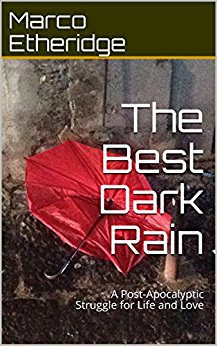 Hello Readers!
Hello Readers!Who doesn't love a giveaway, right? I am offering not one, but two giveaways for your reading pleasure.
Offer Number One: Live now on Amazon, enter to win one of five copies of The Best Dark Rain: A Post-Apocalyptic Struggle for Life and Love. This novel is rated Five-Stars on Amazon.com. There is no purchase required and no funny stuff. Simply click the link below and sign up for your chance to win. Winners will be chosen by Amazon in a random drawing. Click the link to sign up!
Click HERE for "The Best Dark Rain" Giveaway on Amazon
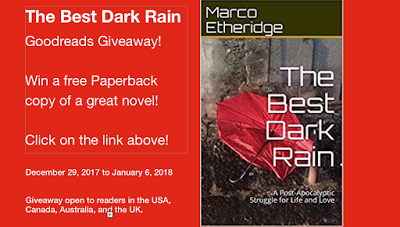
Giveaway Number Two is available on Goodreads. Enter for your chance to win a free Paperback edition of The Best Dark Rain: A Post-Apocalyptic Struggle for Life and Love. Again, no purchase required and no funny stuff. Just click below. This giveaway starts at 12:01 AM on December 29th. Here is the link for the Goodreads Giveaway:
Click HERE for "The Best Dark Rain" on Goodreads
Good luck!!
Published on December 28, 2017 00:53
December 26, 2017
Goodreads Giveaway!!

Sign up for a chance to win a free paperback copy of The Best Dark Rain: A Post-Apocalyptic Struggle for Life and Love. The Goodreads giveaway is open to Goodreads members in the USA, Australia, Canada, and the UK.
The giveaway begins on the tick after midnight, December 29th, and runs to the tick before midnight on January 6th. If you don't sign up, you can't win a copy of this great novel.
Click Here to sign up for the Giveaway!!
Published on December 26, 2017 23:55
December 17, 2017
Book Review
I am feeling very blessed and happy right now. My novel The Best Dark Rain just received its first independent review from the fine folks at Tome Tender. I want to send a HUGE shout-out to the folks at Tome Tender for taking the time to review my novel. Here is the review, which was published today:
The Best Dark Rain: A Post-Apocalyptic Struggle for Life and Love by Marco Etheridge
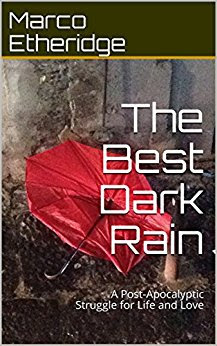
The Best Dark Rain
A Post-Apocalyptic Struggle for Life and Love
by Marco Etheridge
My rating: 5 stars
Publisher: Marco Etheridge Fiction (November 22, 2017)
Publication Date: November 22, 2017
Genre: Post-Apocalyptic
Print Length: 347 pages
Available from: Amazon
[image error]
There is precious little room for love in a dead city, a dead world. For not quite everyone died. Better if they had. Armed bands stalk the streets. In the shadows worse enemies prowl, horrible enemies. At the center of this bleak urban waste lies a makeshift fort. It is the refuge of Liz Walker and Pat O’Shea. They are the last living couple in the shell of what was once Seattle.
Here on these dead streets a woman and a man must learn to love and fight. They bear weapons scavenged from the dead. Each of them carries the shadow of a past that could threaten their future.
Amid murderous survivors and unlikely allies, the threat of hunters and the danger of trusting, Liz and Pat must battle for their lives. The stakes are high. For they must protect their new-found love as well as their lives. To lose either means to face alone this horrific world.
[image error]
The Best Dark Rain by Marco Etheridge
Welcome to life after the apocalypse.
What would happen if science tweaked our food sources just a little too far in order to answer the demand humanity places on the earth? Would Mother Nature fight back with a deadly virus that will kill billions, re-animating many into flesh and blood eating monsters, leaving the only a resistant few alive to fend for themselves? Would the survivors band together or would what is left of humanity degrade into their own form of monster in the name of survival? The cause was only speculation, but to two lovers, surviving on the edge in Seattle, hiding from marauding humans and the monsters that live in the shadows, always thinking, always preparing for the worst was how they stayed alive.
Liz and Pat thought they could be the last couple alive and their fortress was their home, the time foraging for supplies could mean their death. When they discover they are not alone, they will become part of an unlikely alliance, with fellow survivors that would never have bleeped on their radar back in the before times. Would they all survive as a family of sorts? Would the relationship between lovers survive now that the romantic dinners and flowers are gone, replaced with bats, guns and foraging?
THE BEST DARK RAIN by Marco Etheridge is a raw and rather human take on survival in a world gone mad. There are no over-the-top, unrealistic heroics, no heroes larger than life itself, there are real humans forced to dig deep and re-learn what is important to life.
Much of the book involves dialogue as we get to know each character, liking some more than others as they build cautious and honest relationships they would risk their lives for. It is learning to value the whole as much as oneself. Mr. Etheridge does not dwell on the gore, the re-animated humans are not the focal point, they do not come out in droves. They are not always mindless, but they are deadly, just as deadly as the gangs who see an opportunity to become kings over hell.
There is a constant feeling of the unknown just out of reach as we are invited into the tiny piece of the world these characters inhabit as if we are there. This isn’t a fast-paced read, but it is tense and thought-provoking and terrifying. It is also highly recommended!
I received a complimentary Review copy from Marco Etheridge.
Posted by Dii at 10:25 AM No comments: Links to this post
Email ThisBlogThis!Share to TwitterShare to FacebookShare to Pinterest
Labels: Marco Etheridge
The Best Dark Rain: A Post-Apocalyptic Struggle for Life and Love by Marco Etheridge

The Best Dark Rain
A Post-Apocalyptic Struggle for Life and Love
by Marco Etheridge
My rating: 5 stars
Publisher: Marco Etheridge Fiction (November 22, 2017)
Publication Date: November 22, 2017
Genre: Post-Apocalyptic
Print Length: 347 pages
Available from: Amazon
[image error]
There is precious little room for love in a dead city, a dead world. For not quite everyone died. Better if they had. Armed bands stalk the streets. In the shadows worse enemies prowl, horrible enemies. At the center of this bleak urban waste lies a makeshift fort. It is the refuge of Liz Walker and Pat O’Shea. They are the last living couple in the shell of what was once Seattle.
Here on these dead streets a woman and a man must learn to love and fight. They bear weapons scavenged from the dead. Each of them carries the shadow of a past that could threaten their future.
Amid murderous survivors and unlikely allies, the threat of hunters and the danger of trusting, Liz and Pat must battle for their lives. The stakes are high. For they must protect their new-found love as well as their lives. To lose either means to face alone this horrific world.
[image error]
The Best Dark Rain by Marco Etheridge
Welcome to life after the apocalypse.
What would happen if science tweaked our food sources just a little too far in order to answer the demand humanity places on the earth? Would Mother Nature fight back with a deadly virus that will kill billions, re-animating many into flesh and blood eating monsters, leaving the only a resistant few alive to fend for themselves? Would the survivors band together or would what is left of humanity degrade into their own form of monster in the name of survival? The cause was only speculation, but to two lovers, surviving on the edge in Seattle, hiding from marauding humans and the monsters that live in the shadows, always thinking, always preparing for the worst was how they stayed alive.
Liz and Pat thought they could be the last couple alive and their fortress was their home, the time foraging for supplies could mean their death. When they discover they are not alone, they will become part of an unlikely alliance, with fellow survivors that would never have bleeped on their radar back in the before times. Would they all survive as a family of sorts? Would the relationship between lovers survive now that the romantic dinners and flowers are gone, replaced with bats, guns and foraging?
THE BEST DARK RAIN by Marco Etheridge is a raw and rather human take on survival in a world gone mad. There are no over-the-top, unrealistic heroics, no heroes larger than life itself, there are real humans forced to dig deep and re-learn what is important to life.
Much of the book involves dialogue as we get to know each character, liking some more than others as they build cautious and honest relationships they would risk their lives for. It is learning to value the whole as much as oneself. Mr. Etheridge does not dwell on the gore, the re-animated humans are not the focal point, they do not come out in droves. They are not always mindless, but they are deadly, just as deadly as the gangs who see an opportunity to become kings over hell.
There is a constant feeling of the unknown just out of reach as we are invited into the tiny piece of the world these characters inhabit as if we are there. This isn’t a fast-paced read, but it is tense and thought-provoking and terrifying. It is also highly recommended!
I received a complimentary Review copy from Marco Etheridge.
Posted by Dii at 10:25 AM No comments: Links to this post
Email ThisBlogThis!Share to TwitterShare to FacebookShare to Pinterest
Labels: Marco Etheridge
Published on December 17, 2017 09:03
December 5, 2017
Monsters
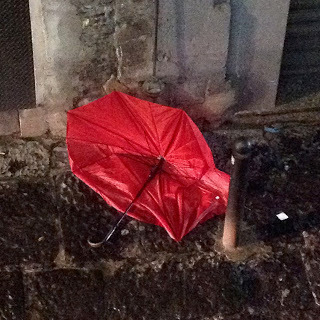 The original photo. It was just a quiet night in Napoli. What could go wrong?
The original photo. It was just a quiet night in Napoli. What could go wrong?A monster has been loosed on the world. Formerly contained, it now has a much broader range, free to roam about as it wishes. To be sure, it still returns to bite me on my unsuspecting ass. It remains a monster; it has to bite. But now it has other interests.
My monster seems a pint-sized demon to everyone save myself. The scaly and taloned thing is a passing apparition to most folks, probably unseen. The monster is, after all, only a first novel. It is not worth even the briefest groan in an otherwise untroubled sleep. Unless you are me. In my eyes, the damn thing is eight feet tall (2.43 meters), with dripping fangs and burning eyes.
The novel, viewed as a fiend, is no invention of mine. Spalding Gray used it in the title of his one-man play "Monster in a Box." In his wonderful, crazy monologue, Gray's first novel lives in a box, travels everywhere he does, and tortures him unceasingly. The novel is titled Impossible Vacation, and was "due to be published two years ago." The thing, this horrible book, becomes a monster living in a box. It is brooding and biting, trapped in the limbo of not-quite-published, gnawing to get out.
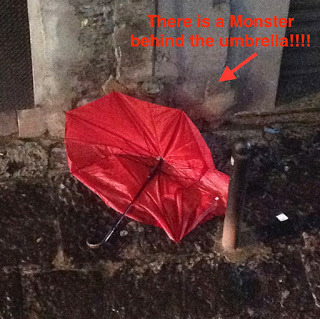 And Then Things Changed
And Then Things ChangedSometimes the monster becomes very real, very dangerous. A Confederacy of Dunces was published eleven years after its author, John Kennedy Toole, committed suicide. Toole's mother found a carbon copy of the manuscript when cleaning out his house following his suicide. Thelma Toole carried the monster around with her until she managed to land it on the desk of Walker Percy, a professor at Loyola University. The story of how A Confederacy of Dunces became published is now a miracle tale, a mantra intoned by the ignored scribblers of the world. We all know the story. We whisper it around secret campfires in hidden forest groves. The book killed Toole, but it went on to become an iconic American novel, a monster freed.
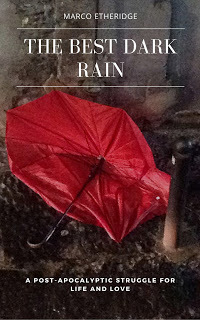 The Monster Morphs
The Monster MorphsAm I comparing my writing to that of John Kennedy Toole or Spalding Gray? Of course not. Well, you are actually, by implication. Okay, maybe a little tiny bit. But they were both suicides. Are you sure you want to use that comparison?Hmmmm, good point. But both were great writers; insightful, funny, very weird.Yeah, but look what happened. I know but...
Pssst! Hey, people are reading this!!!Ahem. Apologies.
The world has changed. (Don't you love vague, stupid statements??) For example, did you know that one is no longer required to double-space between sentences in the same paragraph? Where was that memo? I recently read some articles on the subject and, sure enough, one person wrote "Nothing says Over-Forty like double-spaced sentences." Ouch. Note that the sentences in this blog post are double-spaced. I'm old. Get over it.
Not only has the world changed, publishing has changed. In the halcyon days of my youth, back when double-spaced sentences were the norm, things were different. A writer toiled away on a book, sent it off to publishers, waited, fretted, waited, and was finally rejected. This process was repeated with different publishers until one was either published or, barring other options, offed oneself.
Those were the years of the golden myth, the Big Contract. Advances! Royalties! Talk-Shows! And for the very lucky, and the very few, it actually happened. Those writers at the sharp tip of the iceberg, they had publicists and agents, marketing gurus and hotshot editors. Hand in a manuscript, get the advance on the next book, let someone else deal with editing, proofing, setting the galleys. Not anymore, Bucko!
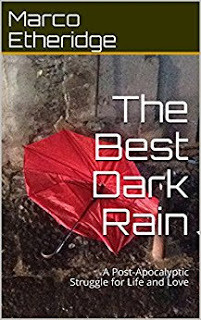 Its Final Feeding Form
Its Final Feeding FormI must ask you to forgive my delusions. I admit to having some notion that, once published, my little monster would easier to be a manage. I believed that it would become what it was intended to be: A Novel. But this is not the case, because the world of publishing has changed.
Gone are the days when authors wrote and publicists publicized. It is now the authors who must do the selling, the trench work, the pimping. Publishing houses and agents want authors who have the "Platform" of an online presence, social media marketing, author websites, and the like. This is the new mantra: "We are all in Sales." And for ones efforts, the publishing house will dole out 7-15% of the gross. Ones agent then gets 10-15% of the net cut. Bookstores return the printed books that do not sell, the cost of which comes off of future earnings. For their pains in writing a little monster, many authors see only the first advance check and nothing more.
Stay tuned for the next blog installment: Pimping the Work
Hey, speaking of pimping the work, here is Rule #1: Always include the link.
Buy the book here!!
Published on December 05, 2017 00:32



